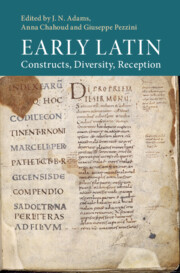Book contents
- Early Latin
- Early Latin
- Copyright page
- Dedication
- Contents
- Illustrations
- Tables
- Contributors
- Acknowledgements
- Abbreviations
- Chapter 1 Introduction: What Is ‘Early Latin’?
- Part I The Epigraphic Material
- Part II Drama
- Part III Other Genres and Fragmentary Authors
- Part IV Reception
- Chapter 20 ‘Early Latin’ and the Fragments of Atellane Comedy
- Chapter 21 Lucretius and ‘Early Latin’
- Chapter 22 Cicero and Early Dramatic Latin
- Chapter 23 Early Latin Texts in Livy
- Chapter 24 Pliny Rewrites Cato
- Chapter 25 Gellius’ Appreciation and Understanding of ‘Early Latin’
- Chapter 26 Views on ‘Early Latin’ in Grammatical Texts
- Chapter 27 Nonius Marcellus and the Shape of ‘Early Latin’
- Chapter 28 ‘Early Latin’ to Neo-Latin
- Chapter 29 Conclusions
- Bibliography
- Index Verborum
- Index of Non-Latin Words
- Index Locorum Potiorum
- Subject Index
Chapter 20 - ‘Early Latin’ and the Fragments of Atellane Comedy
from Part IV - Reception
Published online by Cambridge University Press: 27 July 2023
- Early Latin
- Early Latin
- Copyright page
- Dedication
- Contents
- Illustrations
- Tables
- Contributors
- Acknowledgements
- Abbreviations
- Chapter 1 Introduction: What Is ‘Early Latin’?
- Part I The Epigraphic Material
- Part II Drama
- Part III Other Genres and Fragmentary Authors
- Part IV Reception
- Chapter 20 ‘Early Latin’ and the Fragments of Atellane Comedy
- Chapter 21 Lucretius and ‘Early Latin’
- Chapter 22 Cicero and Early Dramatic Latin
- Chapter 23 Early Latin Texts in Livy
- Chapter 24 Pliny Rewrites Cato
- Chapter 25 Gellius’ Appreciation and Understanding of ‘Early Latin’
- Chapter 26 Views on ‘Early Latin’ in Grammatical Texts
- Chapter 27 Nonius Marcellus and the Shape of ‘Early Latin’
- Chapter 28 ‘Early Latin’ to Neo-Latin
- Chapter 29 Conclusions
- Bibliography
- Index Verborum
- Index of Non-Latin Words
- Index Locorum Potiorum
- Subject Index
Summary
The chapter examines what features of ‘early Latin’ may be identified in the scripts that belong to the literary phase of a type of theatrical entertainment conventionally known as fabula Atellana. Despite being contemporaries of Caesar, Cicero and Varro, the major playwrights of Atellane comedy were linguistically closer to Plautus than to any of them, exhibiting linguistic features – morphology, syntax and lexicon – of third- and second-century BC authors. Much rarer are the occasions in which linguistic phenomena that were obsolescent or old-fashioned in chronologically ‘early’ Latin authors feature in the Atellane playwrights, and even then there are considerations of genre and register to take into account. The overall artistic effect must have been rich, carefully crafted and varied: ‘early’ words and constructions do not seem to be mechanically included in the scripts. The playwrights were conscious that their works formed part of an established comic tradition, and the ‘unclassical’ linguistic features were employed by them not to stress the long-standing history of Campanian/Oscan drama but to give variety to the register of a scene and enhance the comic moment.
Keywords
- Type
- Chapter
- Information
- Early LatinConstructs, Diversity, Reception, pp. 411 - 433Publisher: Cambridge University PressPrint publication year: 2023

